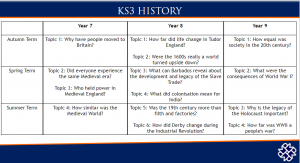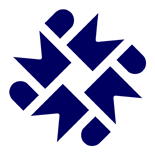Key Stage 3: History
Curriculum Intent
History at Murray Park School will grow a generation of young people who are passionate, curious and active citizens in Derby. Our History curriculum will help students to make sense of the world they live in, and will help them to cement their place within their city. We aim to equip students by developing their knowledge and understanding of the past and helping them understand how and why things have changed.
We want students to develop a love of learning as well as build their enquiry skills, learn to evaluate evidence so they can reach their own judgments and opinions about key historical events. Our curriculum will be enquiry-led, enabling students to experience what it is like to be an historian, trying to answer questions about the past. Our approach to teaching History is based on current thinking and pedagogy. Our curriculum evolves to incorporate new scholarship and our lessons allow students to experience real History.
A key aim of the Murray Park History curriculum is to challenge and re-examine traditional narratives, and give students the opportunity to learn about histories other than the traditional canon of British historical education. The curriculum is therefore a vehicle to promote social justice and the common values of diversity, tolerance, equality and democracy.
The curriculum will be challenging, History is hard! We don’t always have the answers to the questions we are asking and we want our young historians to be able to grapple with these frustrations.
The national curriculum for history aims to ensure that all students:
- Know and understand the history of these islands as a coherent, chronological narrative, from the earliest times to the present day: how people’s lives have shaped this nation and how Britain has influenced and been influenced by the wider world
- Know and understand significant aspects of the history of the wider world: the nature of ancient civilisations; the expansion and dissolution of empires; characteristic features of past non-European societies; achievements and follies of mankind
- Gain and deploy a historically grounded understanding of abstract terms such as ‘empire’, ‘civilisation’, ‘parliament’ and ‘peasantry’
- Understand historical concepts such as continuity and change, cause and consequence, similarity, difference and significance, and use them to make connections, draw contrasts, analyse trends, frame historically-valid questions and create their own structured accounts, including written narratives and analyses
- Understand the methods of historical enquiry, including how evidence is used rigorously to make historical claims, and discern how and why contrasting arguments and interpretations of the past have been constructed
- Gain historical perspective by placing their growing knowledge into different contexts, understanding the connections between local, regional, national and international history; between cultural, economic, military, political, religious and social history; and between short- and long-term timescales
Curriculum Overview
Course outline and structure
Year 7 start with a thematic study covering migration to the UK. Students explore the facts that make people migrate and explain the impact different groups had on Britain. This develops their understanding of thematic studies to complement their understanding of chronology. We then study the Norman Conquest and its immediate and long term consequences on the UK. Term 2 sees Year 7 studying Medieval Life 1066 – 1509 and Term 3 is a study of the medieval world. This enables students to compare medieval England to societies throughout the world and also ensures they develop an understanding of world history. Students learn about how society was run during both periods and what it was like to be alive at these times. Students study the following topics – how society was run and organized, the importance of religion, crime and punishment plus many others. Students also explore a pre-1066 topic in the summer term.
Year 8 build on their learning from the previous year by looking at England during the 16th century, in particular the English reformation, where they evaluate its religious, political and social impact. This is a crucial study for understanding diversity and social change to underpin their knowledge gained in year 7. Students undertake a study of Black Tudors by Miranda Kaufmann which increases their understanding of historical interpretations and how history is forever changing and developing. Term 2 in dominated by a study of World History centred on the British Empire and leading into a study of the big social changes of the 18th and 19th centuries – primarily the Industrial Revolution. Students have the opportunity to study different colonial countries and make their own judgements about the impact of the empire. Students focus on the case study of India. In Term 3, students study the Slave Trade and the Civil Rights Movement in the USA and are then able to make comparisons with the struggles for Women’s Rights in the UK. The People and Protest unit also enable students to compare various protest movements throughout world history and ensure they make comparisons to modern day movements such as BLM and Extinction Rebellion.
Year 9 History at Murray Park is focused on the 20th century. The year runs chronologically starting with the world at the beginning of the 20th century. We then study the origins of World War One and looking in depth at the conflict in the early 20th century. We then study the rise of extremism in the 1930s and the steps to WW2. Students look in some depth at the turning points of World War Two and the impact this had on Europe and the rest of the world. This leads into the final scheme of learning at KS3 which concentrates on the Holocaust and the post war world. Our lessons are designed by the Holocaust Educational Trust and we work closely with the trust to ensure our students receive the best possible Holocaust education. We also have been able to organise a visit with the trust.
An outline of what students will study during their time at Murray Park throughout Key Stage 3 is set out in the table below:

Extra-curricular activities
The department plans to offer a number of curriculum-related trips. In the past students have had the opportunity to visit Warwick Castle and the Black Country museum. We are also hoping to organise a trip to the First World War battlefields of Belgium and Northern France. We are planning to organise a visit to support and enhance learning for each year group at KS3.
Students get the chance to attend the trip to Berlin or the trip to Krakow that run on alternate years. This year we are taking pupils to Berlin. We also have a Holocaust survivor visiting our school to meet with students in year 9. This ensures our students not only learn about history in the classroom but are able to experience real history.
There is also a KS3 History Club who meet one lunchtime a week. Here students have the opportunity to explore additional topics from outside of our curriculum, and to enrich their understanding of those they have studied. We have helped organise the remembrance week in school and are working towards making a remembrance memorial for the new garden.
There is also a KS3/KS4 Debate and Politics club. We meet weekly and run mock debates and trials throughout the year. We take part in the Derby city debate competition with the University of Derby. Students have the opportunity to work with trainee law students and current solicitors to improve their debating skills.
Useful websites
https://senecalearning.com/en-GB/
https://www.bbc.co.uk/bitesize/subjects/zk26n39
https://classroom.thenational.academy/subjects-by-key-stage/key-stage-3/subjects/history

